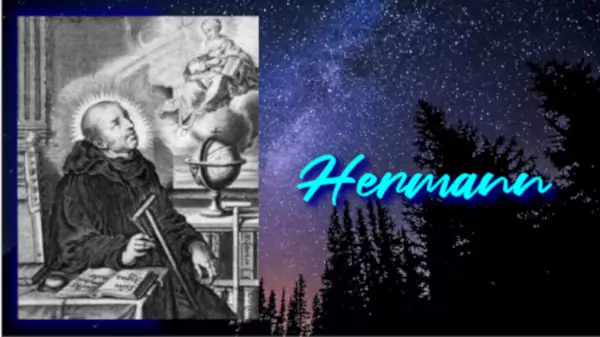25 September - St. Hermann or Hermann of Reichenau, born on 18 July 1013, was the son of Count Wolverad II von Altshausen, belonging to a noble family from Swabia, the Counts Altshausen.
He suffered from general spastic paralysis from birth and for this reason never learned to walk and had great difficulty in speaking comprehensibly and reading; his infirmities earned him the nickname "contractus". At the age of seven, in September 1020, he came to the monastery of Reichenau on Lake Constance. There he took his monastic vows in 1043 and probably spent his entire life as a schoolboy, but as his iron will overcame all obstacles, it was not long before his brilliant achievements shone a light that shone in the most diverse branches of knowledge, including theology, mathematics, astronomy, music, Latin, Greek and Arabic languages in addition to theology; Students flocked to him from everywhere, attracted not only by the fame of his knowledge, but also by his monastic virtues and his endearing personality.
It is probably to him that we owe the division of hours into minutes (probably for his astronomical observations). He played a fundamental role in the transmission of mathematical and astronomical knowledge, which until then had come exclusively from the Arabs. He coined the astronomical term "Almicantarat" to designate a circle parallel to the horizon on the celestial sphere. He invented an astrolabe, a calculating machine and various musical instruments. He distinguished himself artistically as a composer and poet. He took monastic vows around the age of thirty. He died in 1054 and was buried in the family grave in Altshausen.
Hermann composed several songs to the Virgin Mary. He is particularly attributed with the Alma Redemptoris Mater and the Salve Regina. He is also credited with the Veni Sancte Spiritus.
In historiography, we owe him "Chronicle" (Chronicon). This chronicle goes from the birth of Christ to the year 1054. It was continued by his pupil Berthold of Reichenau until the year 1080. As well as "Lives of Emperors Conrad and Henry" (Gesta Chuoradi and Heinrici imperatorum). These are in fact simple additions to the "Life of Conrad". In music and musicology, let us remember the "Traité sur la Musique" (De musica). The "Sequences": "Sequence of the Blessed Virgin" (Sequentia de beata Maria virgine); "Grates honos hierarchia"; "Rex regum Dei Agne"; "Benedictio trinae unitati"; "Exurgat totus almiphonus". And the famous antiquarian Alma Redemptoris Mater and Salve Regina are often attributed to him. As in astronomy and mathematics, his works are also flourishing: "Treatise on the Lunar Month" (De mense lunari, where the duration of the month is estimated at 29 days, 12 hours and 29 minutes). "De la composition des cloges" (De horlogiorum compositione): only a fragment remains. "Rules for chronological calculation" (Regulae in computum).
It was said of him that he was "the wonder of the century", while he claimed: "I am the scum of the poor of Christ who walks behind the philosophers, slower in spirit than a colt".








